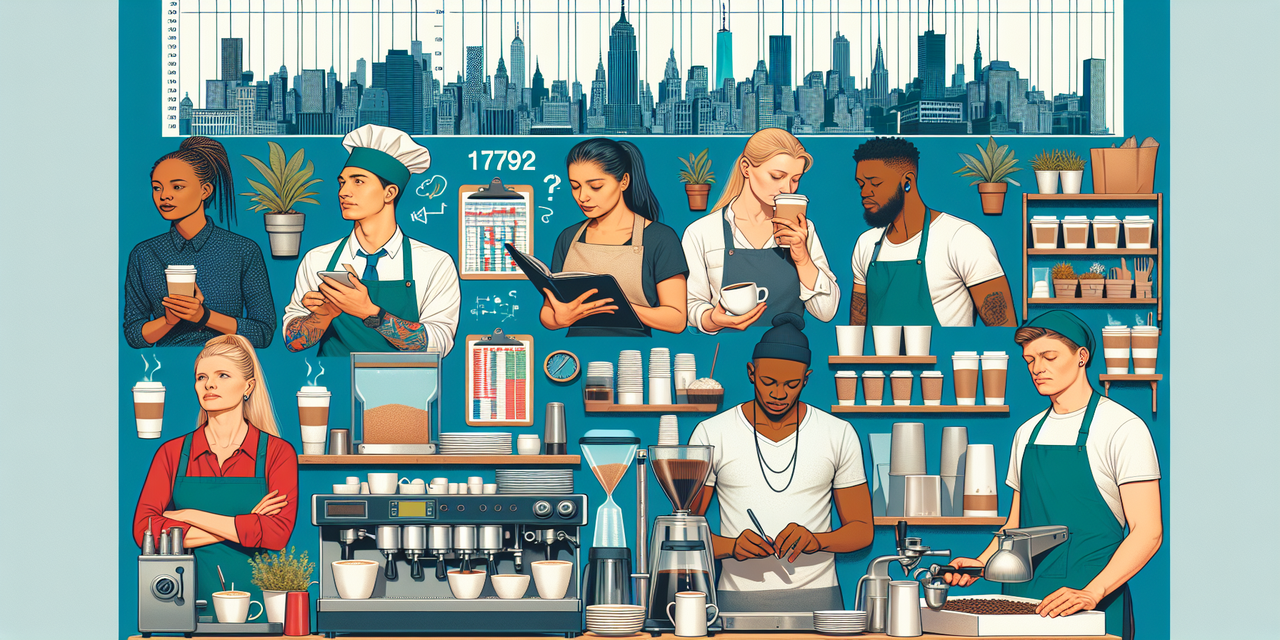New York City Average Overtime Hours by Barista: Key Takeaways
- Baristas in NYC earn a $16.50 hourly minimum wage as of 2025, with a $11.00 base wage plus a $5.50 tip credit.
- Overtime pay applies for hours worked over 40 per week at 1.5 times minimum wage ($24.75); adjusted cash wage with tip credit is $19.25.
- High turnover rates exceeding 75% in food service increase reliance on overtime for baristas, though exact average overtime hours data is limited.
- Effective scheduling, cross-training, labor monitoring, retention strategies, and legal compliance can reduce barista overtime.
Baristas in New York City often work overtime due to high demand and frequent staff turnover. This article explores average overtime hours and strategies to reduce them, improving both employee wellbeing and business costs.
Understanding and managing overtime is crucial for coffee shop owners aiming to create sustainable workplaces while complying with labor laws.
Learn practical tips on restaurant staff hiring to address turnover challenges effectively.
1. NYC Barista Overtime Pay and Wage Laws Overview
As of January 1, 2025, the minimum wage for baristas in NYC is $16.50 per hour. Employers may pay a base cash wage of $11.00 per hour and claim a tip credit of $5.50, provided total compensation satisfies the full minimum wage.
Baristas working beyond 40 hours weekly must receive overtime pay at 1.5 times the minimum wage rate. This translates to $24.75 per hour for overtime hours. The $5.50 tip credit also applies here, reducing the employer’s cash wage responsibility for overtime to $19.25 per hour while tips make up the difference.
Barista Overtime Pay Calculation in NYC
For overtime hours, the calculation is 1.5 × $16.50 = $24.75. The tip credit lowers cash wages paid by $5.50, so employers pay $19.25 cash per overtime hour. Baristas’ total compensation (cash + tips) must equal or exceed $24.75 for every overtime hour worked.
For employers interested in hiring baristas, see our detailed barista job description to craft effective job postings.
2. Understanding Average Overtime Hours for NYC Baristas
While specific data on average overtime hours by baristas in NYC is scarce, indirect indicators help contextualize the issue. The food service industry in New York has a turnover rate often exceeding 75% annually, which leads to frequent staffing gaps.
Such staffing shortages cause management to depend heavily on existing employees working extra hours, increasing baristas' overtime.
Effects of High Turnover on Barista Overtime
The constant need to hire and train new employees means experienced baristas cover shifts longer or take on overtime to maintain operational flow. This pattern spikes labor costs and risks employee burnout.
Explore more about high turnover in hospitality and strategies to address it.
3. Strategies to Reduce Overtime Hours for NYC Baristas
Controlling overtime is beneficial for staff wellbeing, budget management, and compliance with labor laws. Here are proven strategies NYC coffee shops can adopt.
Effective Scheduling Practices
Using sophisticated scheduling software helps forecast customer demand accurately. Proper alignment of staff numbers with busy and slow periods minimizes unnecessary overtime.
Advanced scheduling allows managers to post work schedules at least 14 days in advance, per New York labor regulations, fostering transparency and compliance.
Cross-Training to Increase Flexibility
Training baristas and other employees to perform multiple roles boosts scheduling adaptability. When employees can pivot between tasks, it's easier to cover shifts without requiring the same staff to work overtime repeatedly.
Monitoring and Managing Labor Costs
Regularly reviewing labor reports helps identify overtime trends and inefficiencies. Pinpointing peak overtime periods enables proactive solutions such as hiring temporary staff or adjusting shift times.
Discover top labor management tools in our guide on must-have apps for restaurant owners.
Enhancing Employee Retention
Offering competitive wages, benefits, and career progression opportunities reduces turnover. Lower turnover decreases the need for other employees to fill gaps through overtime.
Ensuring Labor Law Compliance
Complying with New York’s labor regulations—including providing schedules 14 days ahead—helps avoid fines and promotes a positive work environment. This encourages employee loyalty and efficient shift planning.
For legal employers, see our spotlight on hospitality job posting compliance.
4. Benefits of Reducing Barista Overtime for NYC Coffee Shops
Controlling overtime supports financial and cultural goals. Reduced overtime lowers labor costs associated with premium pay and minimizes the risk of wage violations.
Better-managed working hours improve employee satisfaction and reduce burnout and turnover, creating a stable, experienced workforce that enhances service quality and customer experiences.
5. Actions for NYC Coffee Shops to Manage Overtime and Labor Costs
- Invest in reliable scheduling and labor management software to create efficient rosters.
- Develop a routine cross-training program to broaden staff capabilities.
- Regularly analyze labor reports to adjust shifts in line with customer traffic.
- Review employee compensation packages to increase retention.
- Maintain strict compliance with NYC labor laws to avoid penalties and improve workplace morale.
Review our detailed barista interview questions guide to better select your staff.
6. Useful Government Resources for NYC Barista Employers
For accurate, up-to-date wage and labor law information, employers can consult these official resources.
New York City Average Overtime Hours by Barista: Conclusion
Although specific overtime hour data is limited, high turnover rates in New York City’s food service sector imply frequent reliance on barista overtime. Employers can adopt effective scheduling, cross-training, labor monitoring, retention practices, and legal compliance to reduce overtime hours.
Such measures not only improve cost efficiency but also promote employee wellbeing, ensuring a sustainable and successful coffee shop operation in NYC’s competitive market.
Discover key insights on the barista’s passion for hospitality to foster a motivated team.

.png)

.png)
.jpg)